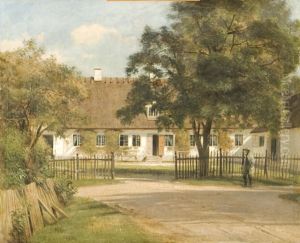Rhode Frederic Paintings
Rhode Frederic, born in 1855, was a German-born American artist whose career spanned the late 19th and early 20th centuries. Not as widely recognized as some of his contemporaries, Frederic's work nonetheless contributed significantly to the American art scene of his time. His journey in art began in Germany, where he was born and initially trained. The specifics of his early education in art remain somewhat obscure, reflecting the broader challenge of piecing together comprehensive narratives of artists from this period who did not reach the pinnacle of international fame.
In search of greater opportunities and inspired by the promise of the New World, Frederic emigrated to the United States. This move was pivotal in shaping his career and the development of his artistic style. Settling initially on the East Coast, he immersed himself in the vibrant and rapidly evolving American art community. His work during this period began to reflect the unique blend of European techniques and the emerging sensibilities of American art, characterized by a focus on realism, the exploration of light, and an interest in capturing the essence of the American landscape and its people.
Throughout his career, Frederic exhibited his work in various venues, gaining respect and recognition among his peers and art patrons. However, his preference for a quieter life and focus on his craft, rather than the pursuit of fame, meant that he remained largely out of the public eye. His contributions were primarily appreciated within the artistic community and by a select group of collectors.
Frederic's legacy is one of dedication to the exploration of the American spirit through art. His paintings, often overlooked in the grand narratives of art history, capture the nuanced interplay of light and shadow, the beauty of the American landscape, and the complexity of human emotion. Despite the lack of widespread recognition, his work continues to be appreciated by art historians and collectors who recognize the subtle depth and beauty of his contributions to American art.
Rhode Frederic passed away in 1939, leaving behind a body of work that, while not extensive, is valued for its contribution to the development of American art. Today, his paintings can be found in various private collections and occasionally on display in museums dedicated to the period of American art history in which he worked. His life and work stand as a testament to the many artists whose contributions form the rich tapestry of the American artistic heritage, reminding us of the importance of recognizing and appreciating the diverse voices that have shaped the art world.
